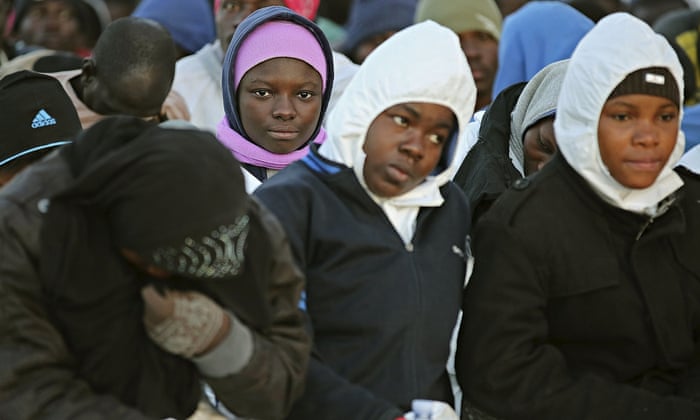Flavio di Giacomo was having dinner in a restaurant on the Italian Mediterranean island of Lampedusa when a group of boys appeared. “I think there were eight of them, all from Eritrea. The youngest was 11 years old,” said Di Giacomo, who works for the International Organisation for Migration. “The boys had left the reception centre and were just wandering around the island. I offered to buy them dinner.”
The boys were from the most vulnerable category of irregular migrants arriving on Europe’s southern shores. According to Save the Children, almost 6% of the 22,507 arrivals so far this year have been “unaccompanied minors”.
As the young Eritreans tucked into dinner, Di Giacomo saw they all had mobile phones. “Before long they were taking pictures of themselves in the restaurant and posting them to Facebook.”
A mobile phone is the most vital item for an under-18 travelling without an adult. “A cellular telephone allows the minors to contact the people who assist them in the various cities they go through,” notes a report on the enslavement of children published last yea¬r by Save the Children Italia. A “selfie” on Facebook posted from Lampedusa tells your parents you have survived the traumatic crossing from Libya.
“Many of the kids arrive in shock,” said Di Giacomo. “By the time they get here, they have seen everything.”
Last week, 15 Muslim migrants were arrested, accused of throwing overboard 12 Christians in a dispute over religion. It was not the first murderous clash between migrants at sea.
Sub-Saharan Africans usually pay the traffickers $500 (£330), less than other migrants, but they are often consigned to the hold – the most dangerous part of the barely seaworthy vessels. “I met some Gambian boys who survived a fight that ended in stabbings and deaths which began when some of the Africans tried to get out of the hold,” said Di Giacomo.
Even before reaching the boats, many young migrants will have risked death in the Sahara and the danger of being robbed, kidnapped or tortured in anarchic Libya. So what drives them to make such a perilous voyage?
“The reasons are varied,” said Carlotta Bellini, Save the Children Italia’s head of protection. “Some of the minors from west Africa – Malians and Nigerians particularly – are escaping from conflict or persecution. I spoke to a boy recently who said, ‘My mother was killed some time back. And then, a month ago, they killed my father.’ It was because they were Christians.”
Girls arriving from west Africa are likely to be on their way to a life on the streets. “The female minors mostly come from poor families, are illiterate and lured with the promise of a job in Europe,” says Save the Children Italia’s report. “Hairdresser, shop assistant and babysitter are some of the more common phoney offers of employment they receive. To some, on the other hand, it is made clear before they leave that they will be prostitutes, but the girls often do not understand what it really means and what will be the real conditions of exploitation and control to which they are going to be subjected.”
The young Egyptians are economic migrants, “mostly boys of 16 or 17”, said Bellini. They used to exploit a provision in Italian law which said that whether they were economic migrants or asylum seekers, minors could not be expelled, but once they reached 18, if they had not been given some form of humanitarian protection they could be returned to their country of origin.
“It used to be the case, however, that they could obtain a residence permit if they agreed to enrol for a three-year integration course,” said Bellini. The law has changed, but last year the number of unaccompanied Egyptian minors doubled, for reasons humanitarian aid workers say they do not yet fully understand.
Eritreans make up the biggest single group. Last year they accounted for more than a quarter of all the under-18s who arrived in Italy without an accompanying adult. Almost all are boys, and almost all are fleeing military service.
“It is often linked to failure at school,” said Bellini – boys who drop out of school can be compulsorily enlisted. Military service in Eritrea is meant to last for 18 months, but can go on for much longer. Save the Children Italia’s report painted a horrendous picture of conscripts “subject to violence and ill-treatment, torture and imprisonment”.
The Eritreans’ route takes them first to Ethiopia, where they face a dangerous crossing of the trenches left over from Eritrea’s 1998-2000 war with its neighbour. They usually spend some time in a refugee camp there before travelling to Sudan and then Libya across the desert.
Young Egyptians often remain in Italy to work, sometimes in dire conditions, to pay off debts their families have incurred to send them abroad. But, for the Eritreans, Italy is merely a stop on the way to their goal of reaching northern Europe. Smugglers in Rome and Milan organise their onward journeys. “For those heading for Sweden, the way lies through Austria and Germany,” said the report. “An alternative route is the one via Paris, from where the journey continues to Holland or Great Britain.”
